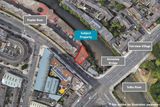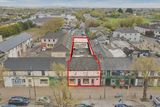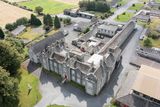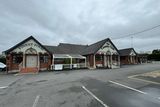Growth in start ups sees surge in serviced offices
Small workspaces such as these at the Digital Hub in Dublin are becoming increasingly popular
With more than 320,000 self-employed people in the country and more than 93,000 of these providing employment for others, there appears to be healthy demand for hot desks, co-working and small business units.
This is reflected in new facilities and the expansion of existing ones.
For instance Regus, the international serviced office provider, has continued to expand with two new locations in Dublin and another in Cork in the last two years bringing to eighth its locations here.
The state agency, Digital Hub, aims to add a further 10,650 sq ft of office space on stream this autumn bringing to more than 113,000 sq ft its accommodation at its Liberties campus in Dublin City centre which already accommodates over 90 IT and media businesses employing more than 650 people.
While rents for serviced offices in Dublin 2 and 4 can prove expensive, one of the key advantages of serviced accommodation is that start-up entrepreneurs need not worry about managing the property or the long-term lease and rental costs. Indeed some are so flexible as to be charged at an hourly rate.
A recent feature of the market has been the arrival of private specialist providers such as Fumbally Exchange catering for designers and architects; Block T which caters for the cultural and creative industries from their base in Smithfield, Dublin 7 and Dogpatch Labs which has opened at CHQ in Dublin's docklands.
Specialist accommodation centres such as these also offer potential opportunities for synergies between like-minded people. "By combining their skills and resources they can compete for larger projects than might be possible on their own and even lead to other new business partnerships," says Eibhlin Curley, assistant head of enterprise at Dublin City Council.
In places such as Dublin central business district rents for serviced office space can range from €400 per desk space per month. But not all are that expensive and some are only €3 per hour.
At Digital Hub rents vary depending on enterprise requirements and those in the Digital Depot building start from €49 per desk per week.
Enterprises which avail of co-working facilities at the Guinness Enterprise Centre (GEC) in the brewery's St James Gate campus pay €100 per month plus VAT and this covers the use of hot desks up to eight times per month as well as access to other facilities at the centre.
Centre manager Eamonn Sayers says that rents for shared offices average €50 per desk per week.
"Those who require their own private offices may pay 10-15pc extra but the rents are designed to facilitate enterprise so the more people employed the lower their average rents," he adds.
At present there are 85 resident companies at GEC using shared or private offices which accounts for more than 90pc of available space. A further 45 enterprises rent co-working space. About 350 people are employed in the centre and the firms located there employ about 700 people worldwide.
Sayers says that the hot desks are in demand among three types of tenants: One group are those who work mainly from home but are preparing to take the next step and wish to avail of the centre's other facilities such as meeting rooms, business address, call answering. Another group are those from outside Dublin who regularly do business in the capital and need a place where they can work and meet clients when in the city. The third group are overseas firms which need a soft landing from which they can scale up their Irish operations.
Resident firms can also avail of supports from Dublin Business Innovation Centre which runs GEC; Halo Business Angels which has done 180 deals and AIB Seed Capital Fund which has invested €53m in enterprises.
Access to a range of networking events has become a feature of both GEC and others such as Block T which is based in Smithfield.
The latter offers a wide range of rental terms. For example its hot desk facility starts with an hourly rate of €3 subject to a minimum of two hours and a membership of €10. Alternatively there are fixed monthly rates which start at €70 for one day per month.
Studio rates range between €200 and €550 per month depending on the size of the studio and its website says it has over 100 studio members. Block T members operate in a range of creative sectors such as fine art, design, illustration, animation, theatre, cinematography, photography, fashion, writing, production, festivals as well as web design and development.
Rent includes light, heat, WiFi, phone line, communal kitchens and other services. Events include members' mornings, professional development forums, screening nights, parties and an annual artists' showcase.
Government agencies and local authorities operate more than 100 enterprise centres which provide accommodation for a range of other businesses including those engaged in food production, manufacturing and distribution.
About 20 of these centres are in Dublin and one of these, Docklands Innovation Park (DIP) on East Wall Road has 150,000 sq ft accommodating 32 firms. Its office units range in size from 300 sq ft to 5,000 sq ft and it also offers own door warehouse units from 4,000 sq ft to 10,000 sq ft.
DIP offices are lettable on flexible terms from €10 per sq. ft. while warehouse units are available from €5 per sq ft. Dublin Institute of Technology operates a Hothouse programme at DIP to incubate 16 high potential start-up firms.
In some enterprise centres there may be no initial rents for those start-ups which show potential to scale up to employ 10 people within six months or generate €1m in turnover within three years. This rent relief could apply to some firms which qualify for the New Frontiers programme offered by the Institutes of Technology and the Enterprise Ireland state agency.
In addition those companies can also avail of mentoring and other support programmes.
Join the Irish Independent WhatsApp channel
Stay up to date with all the latest news














